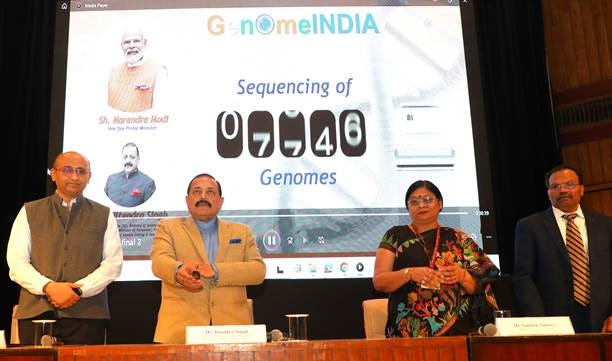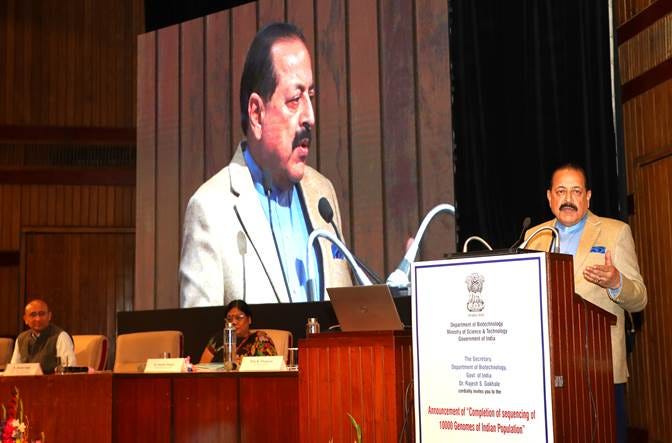NatSec & Biotech #3: 10,000 Indian genomes
US against AI-biotech risks, recommendations for EU biotech, EU Parliament on strategic tech, Gingko-Serbia partnership, India maps its diverse genetic populations
Welcome to the NatSec & Biotech Update: a newsletter on the intersection of biotechnologies and international relations.
In this edition:
USA
U.S. national partnership against AI-biotech risks
Europe
Germany’s Center for European Policy makes recommendations for EU to catch up on biotech
EU Parliament votes to support biotech as strategic technology
Gingko and Serbia partner to boost country as a biotech hub
India
Government launches 10,000 genomes project to genetically map India’s diverse population, develop tailored medicines
USA
NIST partnership to secure biotech from AI risks (MeriTalk)
The National Institute of Standards and Technology (NIST) has established a two-year partnership with the nonprofit Engineering Biology Research Consortium (EBRC) to secure biotechnologies from risks associated with AI systems.
NIST and EBRC will develop screening and safety tools to defend against the potential misuse of AI related to nucleic acid synthesis — a growing field of synthetic biology with great promise but also serious risks.
The new collaboration was initiated by NIST to fulfill a tasking in President Joe Biden’s October 2023 executive order on AI. The executive order charges multiple agencies, including NIST, with developing standards, best practices, and implementation guides for nucleic acid synthesis.
“The Executive Order on AI calls on NIST to initiate an effort to engage with industry and other stakeholders to develop safeguards to defend against potential misuse of AI related to the synthesis of genetic material,” NIST said.
“This agreement is the first step toward promoting safe research in engineering biology as tasked to NIST under the recent AI executive order,” said Under Secretary of Commerce for Standards and Technology and NIST Director Laurie E. Locascio. “The promise of this technology is immense, but clearly safeguards are needed to protect the public, and this is an important first step toward creating them.”
As part of the cooperative agreement, the organizations will solicit input from industry, universities, government agencies, and other relevant stakeholders.
More on the U.S. and biotech:
Environment Protect Agency (EPA) and Department of Energy (DOE) announce to release up to $9.4 million to develop advanced biofuels (NLR)
Biotech industry warns of “punishing” policy environment this election year (BIO)
U.S. bioeconomy worth $950 billion, thanks to federal policies (GreenBiz)
Europe
German think tank calls for “value chain strategy” to support EU biotech (Centrum für Europäische Politik)
A study by the Freiburg/Berlin-based Center for European Polciy (CEP) notes that European biotech is lagging behind the United States and China, and makes recommendations to catch up.
“To maintain its position in the global technology race, the EU should seek to build on the key strengths of its most innovative regions,” said CEP technology expert André Wolf, author of the study.
The study says there are significant barriers to the commercialization of biotech innovations in the EU. These include insufficient access to venture capital and a shortage of skilled labour. Sustainability issues in the extraction of raw materials and the complexity of the product landscape are hindering market acceptance in some segments. “Policy strategies to overcome growth barriers must take a value chain perspective,” said Wolf.
The study outlines three policy fields of action: securing access to critical inputs, supporting the formation of green markets for biotechnologies, and strengthening cooperation between stakeholders along the value chains. The EU generally enjoys a high degree of trans-regional research cooperation.
“A coherent implementation of the funding instruments requires a continuous exchange between politics and industry as well as binding quantitative targets for the reduction of fossil resources,” Wolf said.
European Parliament votes to include biotech in EU support for strategic techs (EuropaBio)
The European Parliament’s vote on the Strategic Technologies for Europe Platform (STEP) included biotech, according to its OECD statistical definition.
The Platform aims to facilitate and incentivize funding for projects in the strategic fields of digital and deep tech, clean tech, and biotech.
The STEP Regulation includes an added financing of €1.5 billion and aims to streamline and make better use of existing funds, through the “sovereignty seal” awarded to projects contributing to STEP objectives, which will facilitate the granting of EU funds and attract additional funding.
Biotechnologies play a key role in the development and production of critical compounds, products, and technologies across multiple sectors. Scaling up investment in biotech and biomanufacturing will significantly contribute to Europe’s green transition and strategic autonomy.
Serbia and Ginkgo Bioworks announce bioeconomy collaboration (Gingko Bioworks)
U.S. biotech giant Ginkgo Bioworks, which is building the leading platform for cell programming and biosecurity, and the Government of Serbia have announced a Memorandum of Understanding (MoU) to collaborate in support of Serbia’s bioeconomy.
Under the planned partnership, Ginkgo and the Serbian Ministry of Science, Technological Development and Innovation will work to set up a Startup Accelerator that leverages Ginkgo’s horizontal platform and extensive expertise to create and support Serbian companies building with biology. Startups will be able to leverage Ginkgo’s end-to-end R&D services to quickly progress on projects that would otherwise require substantial resources and infrastructure.
Startups and larger companies alike can take full advantage of Serbia’s new BIO4 campus, gathering more than 1,000 PhD scientists from 17 scientific institutions. The campus itself will open in 2026. MoUs on mutual cooperation have already been signed with AstraZeneca, BGI, Merck, Pfizer, Roche, SK Biosciences, Frontier Biopharm, Swiss Rockets and Takeda, with more in the works.
Under the MoU, Ginkgo and Serbia will also explore partnerships to develop and implement new biomonitoring capabilities. For example, the planned partnership will support capacity-building and biomonitoring throughout Serbia’s public health sector, including working to implement innovative pathogen monitoring programs at strategic nodes, such as ports of entry and animal farms.
“BIO4, and the vibrant ecosystem coming together in Serbia, is an extraordinary community with a shared motivation to use biology to address major health, societal, and environmental challenges,” said Austin Che, Co-Founder and Head of Startup Innovation at Ginkgo Bioworks. “Countries around the world are recognizing the transformative power of synthetic biology as a strategic technology and the importance of pathogen monitoring for preparedness.”
Serbian Minister of Science, Technological Development and Innovations Dr. Jelena Begovic said: “This partnership additionally strengthens the BIO4 campus as an attractive and dense R&D site in the European landscape. Having Ginkgo, as one of the most advanced biology companies in the world, in the BIO4 ecosystem means that all other stakeholders can benefit as well. Building on Serbia’s already well-regarded AI and digital engineering talents, the government recognizes economic and health benefits of the new biorevolution that is unfolding, and strongly supports the vision to become one of the European leaders in the field.”
The MoU was signed at the Biotech Future Forum, an international gathering event organized by the Centre for the Fourth Industrial Revolution (C4IR) in Serbia. The Centre is part of the C4IR network and co-founded by the World Economic Forum (WEF) and the Government of Serbia.
India
10,000 genome project to map India’s genetic diversity (Government of India)
Indian Minister Dr. Jitendra Singh announced the GenomeIndia Flagship Programme of 10,000 Genome Sequencing in New Delhi. He said the project is “a watershed moment for India” which will enable genetic-based remedies and boost public healthcare.
Genome India will sequence the whole genomes of 10,000 health individuals from 99 communities, representing all major linguistic and social groups, across the country, with the goal of identifying and cataloguing the genetic variations.
Singh predicts genome sequencing will determine the future healthcare strategies across the world, both therapeutically and prophylactically.
The minister said India’s population of 1.3 billion is made up of over 4,600 diverse population groups, many of which are endogamous (marriage within close ethnic groups). These groups have unique genetic variations and disease-causing mutations not comparable to other world populations. The project will create a database of Indian reference genomes to gain insights about these unique genetic variants and ultimately create personalized drugs for the Indian population.
The minister said India’s bioeconomy has grown 13-fold over the last 10 years from $10 billion in 2014 to over $130 billion in 2024.
GenomeIndia is a consortium of 20 national institutes funded by the Department of Biotechnology.
Other biotech policy news
“Five reasons why the anti-biotech movement is in retreat” (Alliance for Science)
Brazil kickstarts G20 bioeconomy initiative (Carbon Pulse)
“To reverse deforestation and protect biodiversity, build a bioeconomy in the Amazon” (Mongabay)
“Minister Lord Benyon leads bioeconomy region to Costa Rich (gov.uk)
“CSIRO and Main Sequence project $30b and 50k jobs for Australia by 2040” (Dynamic Business)
“From a year down to two weeks: Chinese scientists create efficient plant gene editing tool that leapfrogs over ‘tedious’ steps” (Genetic Literacy Project)




